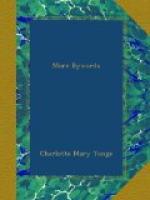“Ay, sir, save for the Norman! But I would not, if I could, meddle with thee, my young lord, though thou dost look at me askance, spite of having learnt of me to ride and use thy lance. I am the last of the English line of old Sigfrid the Wormbane, and a childless man, and I trust the land and the serfs will be well with thee, who art English born, and son to Wulfrida of Lexden. And I trust that thou, my sweet Lady Mabel, will be a happy bride and wife. All I look for is to end my days under the Cross, in the cause of the Holy Sepulchre, whether as warrior or lay brother. Yes, dear lady, that is enough for old Sigbert.”
And Mabel had to acquiesce and believe that her old friend found peace and gladness beneath the eight-pointed Cross, when she and her brother sailed for England, where she would behold the green fields and purple heather of which he had told her amid the rocks of Palestine.
Moreover, she thought of him when on her way through France, she heard the young monk Bernard, then rising into fame, preach on the beleaguered city, saved by the poor wise man; and tell how, when the city was safe, none remembered the poor man. True, the preacher gave it a mystic meaning, and interpreted it as meaning the emphatically Poor Man by Whom Salvation came, and Whom too few bear in mind. Yet such a higher meaning did not exclude the thought of one whose deserts surpassed his honours here on earth.
THE BEGGAR’S LEGACY
An Alderman bold, Henry Smith was enrolled,
Of the Silversmiths’ Company;
Highly praised was his name, his skill had high fame,
And a prosperous man was he.
Knights drank to his health, and lauded his wealth;
Sailors came from the Western Main,
Their prizes they sold, of ingots of gold,
Or plate from the galleys of Spain.
Then beakers full fine, to hold the red wine,
Were cast in his furnace’s
mould,
Or tankards rich chased, in intricate taste,
Gimmal rings of the purest gold.
On each New Year’s morn, no man thought it scorn—
Whether statesman, or warrior brave—
The choicest device, of costliest price,
For a royal off’ring to crave.
“Bring here such a toy as the most may joy
The eyes of our gracious Queen,
Rows of orient pearls, gold pins for her curls,
Silver network, all glistening sheen.”
Each buyer who came—lord, squire, or dame—
Behaved in most courteous guise,
Showing honour due, as to one they knew
To be at once wealthy and wise.
In London Guild Hall, the citizens all,
Esteemed him their future Lord Mayor;
Not one did he meet, in market or street,
But made him a reverence fair.
“Ho,” said Master Smith, “I will
try the pith
Of this smooth-faced courtesy;
Do they prize myself, do they prize my pelf,
Do they value what’s mine
or me?”




